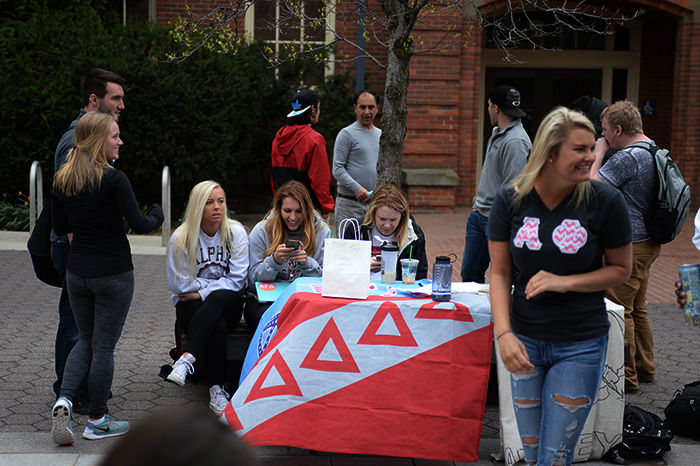In defense of fraternity and sorority life from a non-Greek student
Students tabling at a Penny Wars event during Greek week on the Glenn-Terrell Friendship Mall on April 12. Participants competed by trying to get the most donated money.
November 15, 2016
November has been a wild month for opinions, especially here in Pullman.
Between the results of our nation’s presidential election to the latest moratorium imposed on local fraternity and sorority life, it would seem like no conversation can be had without divisiveness.
With the moratorium on social activities specifically, I’m witnesses people across the spectrum of beliefs desiring fundamental change.
Steps are being taken by these people to make that change.
Not everyone likes the steps, though, and the response is causing two dangerous divides. One divide between the Greek community itself, and another divide between Greek affiliated students and non-Greek affiliated students.
I hope the argument I’m presenting here, in my defense of the moratorium and the sustenance of fraternity and sorority life as a whole, won’t cause more divisiveness.
Instead of abolishing the Greek system, we should maintain and strengthen every Greek community on college campuses across the nation.
I believe WSU’s leaders are already doing that.
I’m not a member of the Greek community. I’m a student who works a handful of odd jobs while studying multi-media journalism and women’s studies.
I’m a straight, white, Christian male student; I recognize my privilege.
These facts may impact your perception of my opinion, but do not let them impact the value of the facts supporting my opinion.
In some way, shape or form, we each reap benefits in spite of losses from fraternity. I’m writing to remind us of that.
I know most of you are not affiliated with Greek life at WSU.
The WSU Center for Fraternity and Sorority Life reports only 24 percent of WSU’s student body pledged to a local Greek chapter.
Nearly four-fifths of WSU’s 23,070 students choose to affiliate elsewhere.
You may not think you are in a fraternity or sorority, however, when you take a moment to reflect on what that elsewhere is, you’re bound to realize you’re pledged to various structured, fraternizing communities in similar ways.
Your churches, your workspaces, your clubs, your teams, your committees — most methods of organizing a community are similar to fraternities.
The Greek system generally abides by five common traits: secrecy, gender-exclusivity, governance, ownership and application of symbols for identification. However, it is not restricted to these.
Fraternity and sorority life on college campuses have evolved to emphasize multiculturalism. Some chapters have formed to abolish gender-exclusivity and to take a stance against Title IX exemptions, like at Wesleyan University.
Elitism in Greek chapters has slowly decreased through affordability measures, broader academic expectations and partnerships with administrative minority efforts.
Churches, work spaces, clubs and teams also commonly participate in secrecy, exclusivity, governance, ownership and symbol application. They evolve, too, but they have the same structure and the same problems.
The five most common issues I hear or read about in the Greek community are alcohol abuse, drug abuse, sexual assault, hazing and race-related crimes. These are horrible, disgusting, systemic problems that have no place anywhere. Nevertheless, they are not exclusive to fraternity or sorority life.
There is not enough space to give examples for each issue. Since alcohol abuse in correlation with sexual assault is the most relevant in Pullman, which helped persuade the Interfraternity Council and the Panhellenic Council to issue the moratorium, I will focus on that.
Alcohol abuse directly impacts more than 16.3 million adults in the U.S., as of the last federal report released in 2014.
That same year, the National Institute on Alcohol Abuse and Alcoholism found only 59.8 percent of full-time college students aged 18-22 have consumed alcohol in the past month.
Even if every active Greek member in the nation abused alcohol, there are only 750,000 registered undergraduates spread across 12,000 chapters on more than 800 campuses, according to The Fraternity Advisor.
As a result, the Greek system would only contribute a small portion of alcohol abusers in the nation.
For sexual assault, one in five women and one in 71 men are raped in the U.S., according to a 2015 report from the National Sexual Violence Resource Center. One in four girls and one in six boys are sexually abused before the age of 18. Eight of 10 rape cases involve a victim who knew his or her assailant. More than 90 percent of victims on college campuses do not report assaults.
In any college town, 88 percent of sexual offenses take place exclusively on-campus, according to a 2015 National Crime Victims’ Rights Week Resource Guide.
The problems are just as, if not more, prevalent per capita in your churches, your work environments and with your club or your team.
So when you read about suspensions in Mississippi, party bans in California, chapter closures in Rhode Island and halts on social events in Washington, remember your communities are struggling with the same problems.
Fraternity and sorority life is not for everyone. It can’t be. It wasn’t for me and it’s not for 76 percent of WSU’s students, but I’m thankful it exists.
I’m thankful it’s a structured outlet with opportunities to positively impact people, our school and the city of Pullman. I’m thankful it has changed, is changing and will continue to change. It’s clear the things we all desire to see change are prevalent wherever we unite ourselves.
Every positive action made to advance the good of humanity should be encouraged.




















